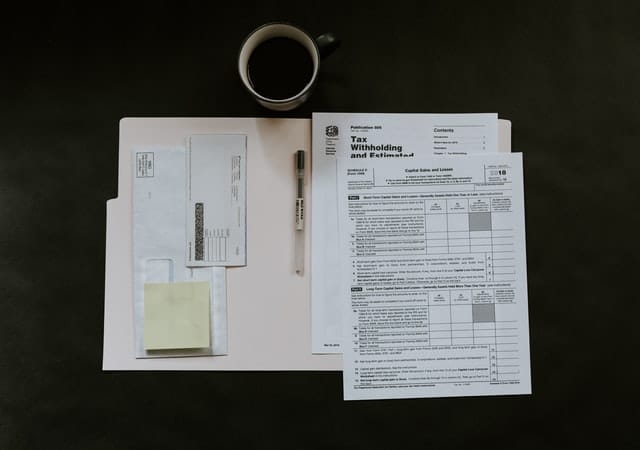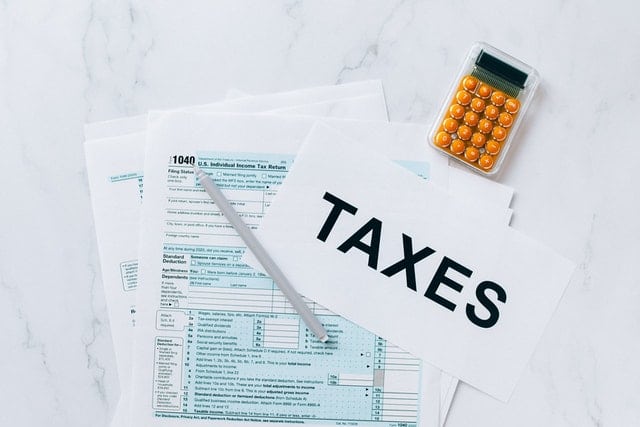Even if you’re brand new to the world of rental property investing, you’ve likely bumped into the fact that capital gains taxes can take a big chunk out of your profits when you sell your property. Another important tax to know about, though, is the depreciation recapture tax. Understanding how to avoid depreciation capture tax on rental property is essential if you want to reduce your tax bill at the time of sale.
Depreciation recapture tax is dreaded by many investors for two primary reasons. First of all, this is a tax on previously enjoyed savings rather than money you currently have. Secondly, the amount owed for depreciation recapture tax can be even more than the amount owed for capital gains tax.
Understanding depreciation recapture is very important, as it will likely come as a big shock if you don’t plan ahead for it.
Let’s take a look at everything you need to know about depreciation capture tax on rental property.
Rental property depreciation recapture is the method through which the IRS collects taxes on the gains that you made by reducing your taxable income through depreciation.
When you own a rental property, you can reduce your taxable income by claiming the depreciation expense. This is considered one of the primary tax advantages of owning investment properties.
However, real estate has historically been an asset that appreciates over the years, which means that many investors claim the depreciation deduction while actually enjoying property appreciation during their time of ownership. On top of that, you might realize a capital gain if you end up selling the rental for more than your cost basis in it.
Basically, when you sell your property the IRS requires that you pay the taxes you didn’t pay thanks to the deduction you claimed.

Let’s do a quick review on what depreciation is before we start getting into the details about depreciation recapture.
When you own rental property, the IRS will let you depreciate the property for each year of ownership. For residential rental property, this benefit lasts for up to 27.5 years.
This is considered one of the best tax perks of owning rental properties.
The reason that you can claim depreciation on your rentals is that the IRS assumes your property will depreciate (or wear out) over time. Because of this, you can use the depreciation expenses to offset the amount of your net income that is taxable.
Let’s say that you purchased a rental property for $150,000. Depreciation only applies to the rental and not the land, so in order to use the depreciation expense, you’ll have to subtract the value of the land from the purchase price.
For this example, let’s say that the value of the lot is $30,000.
This means that your property, minus the value of the lot, is $120,000.
You can then reduce your taxable net income using this annual depreciation expense. If your NOI is $7,000 every year, your taxable income is reduced to about $2637. As you might imagine, that can result in enormous tax savings.
The downside of this is that when you sell the property, the IRS is going to want to take this benefit back through depreciation recapture tax.

Different types of assets follow distinct depreciation schedules as outlined by the IRS. US taxpayers can take a look at the depreciation schedules published by the IRS to find out how much they can deduct from their taxable income based on the value of their assets. In these schedules, they can also determine the deduction term limits.
By claiming these deductions on expensive assets, taxpayers can reduce the amount of income they pay taxes on, which, in turn, reduces their tax bill. If the taxpayer decides to sell the asset, however, the depreciation recapture goes into effect.
Let’s say that you sell a rental property for a profit. When you do this, your normal income tax rate will be applied to how much depreciation had been deducted previously. This is a way for the IRS to collect tax money from asset sales that had been used to offset taxable income in the past.
If you claimed a total of $30,000 in depreciation over the course of ten years of ownership, it means you claimed $3,000 each year that you owned the property. If you are taxed at the 25% depreciation recapture rate, you would owe the IRS $7,000. On top of that, you might also owe capital gains tax. This can significantly reduce the benefit that claiming depreciation had on your overall tax burden.
As you might imagine, individuals and businesses alike try to avoid paying depreciation recapture tax when possible in order to keep as much profit as they can when they sell an asset for a gain.

The best way to understand how to calculate depreciation recapture tax is with a simple example. Let’s say that you purchased a rental property for $110,000 ten years ago, including all of the closing costs associated with the transfer.
In our example, let’s say that when you bought the property, the value of the lot was $10,000 based on the report from the tax assessor. This means that your property’s cost basis is $100,000. This is the amount that you can claim the depreciation expense for.
Over the ten years that you owned the property, you claimed $3636.36 every year. You can find the amount that you can claim for depreciation by dividing the cost basis by 27.5 years.
Over the course of ten years, you reduced your taxable income by $36,363.60.
When you sell the property, the IRS will want to get its money back.
The entire amount of depreciation claimed in this example is $36,363.60. The IRS will tax the depreciation recapture at the same rate as the investor’s ordinary income, up to 25% maximum.
Let’s say that the investor’s normal income puts them in the 22% tax bracket for federal taxes and they are married and filing a joint return. This means that they would need to pay $7999.99 in depreciation recapture tax ($36,363.60 x 22%.)

The realization that you will be required to pay depreciation recapture tax when you sell your rental is likely a pretty big bummer. However, there are a number of ways that you can avoid this tax if you plan ahead.
One common strategy for avoiding depreciation recapture tax is using the IRS code section 1031 to your advantage. This is often referred to as a “1031 Exchange.”
Basically, this lets you “swap” your rental property for another investment, which lets you defer the capital gains tax and depreciation recapture tax you would normally owe.
In order to make this work, the new property you purchase has to be similar enough that it’s considered a “like-kind exchange.”
Many investors use this strategy to reduce their tax burden as they expand and change their rental property portfolio. It’s important, though, to understand that there are some downsides to this strategy. One of the most obvious of these cons is that you won’t have access to the cash from your sale, meaning that if you need the profits for other purposes this method won’t work for you.
Another way to avoid paying depreciation recapture tax is to sell your property at a loss. When you aren’t making a capital gain from the sale of an asset, there isn't a gain to be taxed.
However, this only makes sense in certain circumstances. For example, it’s obviously a bit silly to sell a property for a $100,000 loss just to avoid depreciation recapture tax and capital gains tax that amounts to significantly less than $100k.
In some situations, though, it could make sense for you. For example, maybe you want to sell a property to a family member for a steal, and this matches up nicely with your desire to avoid a big tax hit.
It’s worth noting, though, that selling a property at a loss to a family member is considered a “gift of equity.” This means that it will need to be reported to the IRS. It will later be considered when the estate tax is calculated on assets after death.
In most cases, intentionally selling a rental property at a loss isn’t worth it just to avoid the tax bill. However, maybe your property really is worth less than you bought it for, and avoiding depreciation recapture tax and capital gains tax is a silver lining around the otherwise negative situation.
Finally, the third option is to keep the rental property until you die. There is something known as a “step-up in basis” that happens when you die written into the tax code.
When you pass away, the cost basis of your investments (whether their investment properties, stocks, or something else) will be recalculated to fair market value. This is a way that you can pass wealth onto your children without sticking them with a giant tax bill along with their inheritance.
It’s important to know that this is a part of the tax code that has been threatened at various times in recent history, but it still stands at this point.
It may not always be possible or practical to keep a rental property until you die, but this is certainly a great option for passing wealth onto your children while also avoiding depreciation recapture tax. If a part of your reason for investing in rental properties is to build family wealth, this might be the best option on the table.
Are you wondering where you should invest in real estate? Check out the best places to buy rental properties in the U.S.
If this is the first time you’re learning about depreciation recapture tax, or you’re starting to dig in deeper to find out everything you can about this sneaky tax, you likely have more questions. Let’s take a look at some of the questions that are frequently asked about depreciation recapture tax.
If you hate the idea of paying depreciation recapture tax when you sell your rental property, you might very reasonably consider the idea that you could simply not claim the depreciation expense while you own the rental. After all, why save money one year just to have to pay it back later?
Unfortunately, this strategy won’t work. The reason for this is that the tax law is written so that recapture is calculated on depreciation that was “allowed or allowable.” This means that you will owe the tax whether or not you claimed the depreciation expense. Ouch.
Basically, if you were entitled to such a claim, the IRS sees it as though you claimed it, even if you didn’t. For this reason, it’s a good idea to always claim depreciation on your rentals since you’ll be facing this tax when you go to sell regardless.
Before you start claiming depreciation expenses on your rental, you’ll want to make sure your property qualifies. According to the IRS, any rental property can be used to claim the depreciation expense so long as:
Properties that you can’t depreciate, on the other hand, include:
One of the ways that people reduce the amount of capital gains tax they owe when they sell a rental property is by living in the property for a specific period of time. However, living in an investment property won’t reduce your depreciation recapture tax.
If you’re interested in avoiding some of your capital gains tax by living in your rental, you’ll need to own it for at least five years and live in it for two out of the most recent five years. Once the property is established as your primary residence, you’ll be able to reduce the amount of the capital gain that is taxed when you sell.
In order to report depreciation recapture, you’ll use Form 4797. This is the form that is used for recording the sale of business property. You’ll use Schedule D and Form 1040 for any personal gains.
To new investors, when to start claiming the depreciation expense can be a bit confusing. For example, there might be a number of milestone dates in your investment journey. Let’s say you bought your rental on January 4, fixed the place up and listed it for rent on April 22, and signed a lease with your tenant on May 18.
According to the IRS, the date that you can start depreciating an investment or rental property is when it is “in service.” This means that your rental property is ready and available for tenants to move into and live in.
From the example we gave above, the place was ready to rent out on April 22. This means that you can start depreciation based on this date, even though it took nearly a month to sign a lease with the tenant.
No, the depreciation recapture tax doesn’t apply if you sell your rental property for a loss. It’s typically not a good idea to lose money on the property just to avoid the tax. However, if that’s just how the wind is blowing that month, you can at least know that you won’t have to deal with depreciation recapture tax or capital gains tax.
The amount that you can depreciate off each asset you own is limited by the IRS. There are different depreciation caps on different classes of assets, such as rental properties, expensive equipment, and vehicles. If your property qualifies for depreciation, you’ll be able to use the Modified Accelerated Cost Recovery System (MACRS) to determine how much you can claim for depreciation.
According to MACRS, the useful life of a residential rental property is about 27.5 years. What this means is that every year, you can depreciate 3.636% every year of the total cost basis of the property.
The cost basis is how much you initially paid to purchase the property, minus the value of the land, but including additional fees like transfer fees and title fees.
Additional improvements you make to a rental after you purchase it are also included in the cost basis. They have to add “real value in order to qualify, however, which can include things like installing AC, adding amenities like a gym for tenants, and more.
Other costs aren’t considered a part of the cost basis, such as fire insurance premiums, the costs to get mortgage insurance premiums, the costs of refinancing a loan, and any rent you paid before closing.
There’s a good chance your rental property isn’t “in service” exactly at the beginning of the year, which means that you won’t be able to claim the full depreciation amount for your first year of ownership.
To help investors figure out how much they can claim for this first year, the IRS published a calendar, which is as follows:
This table can also be useful for the year that you chose to “retire” your rental property, which means that you stop using it as a property for the purposes of producing income. This might mean that you sell it, exchange it, abandon it, or convert it to a different use. This also applies if the property is somehow destroyed.
While it can be disappointing to realize that you might have to pay depreciation recapture tax when you sell your rental, there are other tax deductions that make owning rental property a favorable investment vehicle. Let’s take a quick look at some of the other deductions you can claim for rental properties.
When you plan on deducting as much as possible from your taxable income using your rental, it’s essential that you keep thorough documentation of all of your expenses.
When you need to make repairs and otherwise maintain the property to keep it in good shape, these expenses are tax deductible. This is different from capital improvements, which are things that boost the value of the property. The types of repairs and maintenance that are deductible include things like painting, plumbing, and landscaping.
Do you own your rental with a mortgage? If so, you can deduct the interest that you’re paying on the loan. Your lender will usually send you a 1098 Form at the start of the year that outlines how much money you paid in interest in the previous year.
Are you not really sure how interest works on a mortgage loan? This guide outlines everything you need to know about amortization.
Having insurance on your property is considered a qualified business expense, which means that you can typically deduct them. If your rental property business has employees that have insurance as a benefit, that’s also deductible.
The expense of hiring a lawyer or other professionals to help you operate your rental business is also tax deductible. This can include helping you set up your business entity, paying lawyer fees for advice, or helping during lawsuits you face. You can also usually deduct expenses associated with an eviction as well.
Are there people that help you maintain your rental property? The wages you pay them can be deducted from your taxes. This might include a property manager, landscaper, handyman, or painter.
Sometimes, landlords will take care of utilities and include them in the rent. If you go this route, you can deduct these expenses.
Money you put towards advertising your properties, whether it’s online, on the radio, or in print, can often be deductible from your taxes.
Are you wondering if you can determine the value of your property through the amount of rent you collect? You can learn how to calculate property value using rental income here.
You can often deduct the expense of traveling to and from your rental property using the standard mileage deduction. This might not be much of a help if you live next door, but it can add up if you have to travel quite a bit to manage the property.
You might also choose to deduct travel that you do in order to carry out maintenance to the property, for example, driving to the hardware store to get a necessary part for fixing the gutters on the property.
Understanding the way that owning rental properties impact your tax bill is essential when you’re beginning the journey into real estate investment. There are a lot of great tax benefits to owning rentals, but you can get stuck with a big bill when you sell if you don’t plan ahead.
Of course, paying depreciation recapture tax and capital gains isn’t necessarily a reason to avoid owning rentals. After all, you have to consider how much income you can pull in through rent in addition to how much you stand to profit when you sell the place. Depending on how much you expect the property will appreciate and how long you intend to rent it out, you might find that you’re happy to foot the bill considering how beneficial the property is to your long-term financial goals.
Running the numbers is vital before you purchase a rental property. No matter how great something looks or feels, you’ll want to make sure that, when all factors are considered, the property you’re thinking about buying is going to be net beneficial to you. Check out our rental property calculators to help you compare potential properties and create a short list of ideal candidates.
We encourage you to share this article on Twitter and Facebook. Just click those two links - you'll see why.
It's important to share the news to spread the truth. Most people won't.